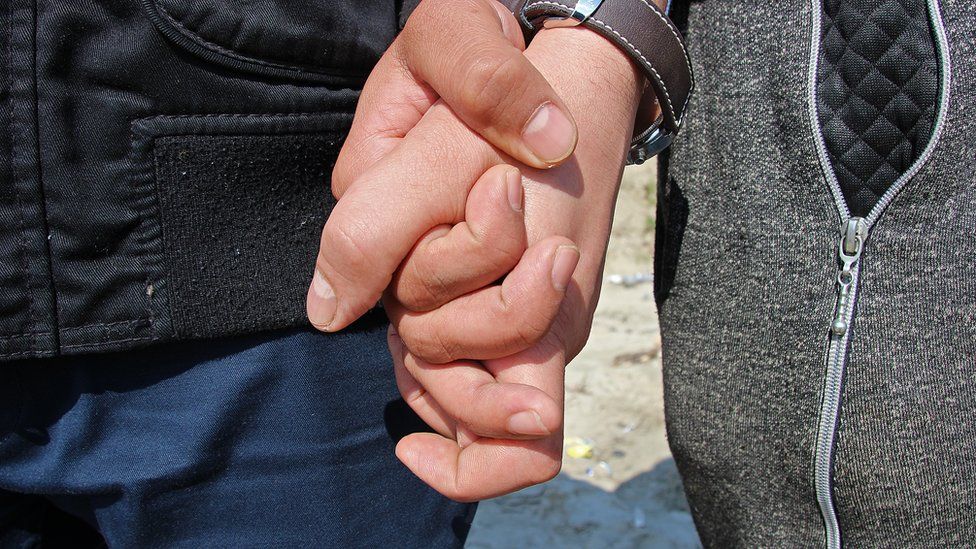BBC helps bring Afghan brothers together
- Published

The BBC's Today programme, together with a freelance journalist, has helped to unite two Afghan brothers who had given up hope of ever seeing one another again, seven years after they were separated in their home country.
Noor and Alam can't stop hugging and crying. They haven't seen each other for more than seven years.
Noor, who is 22, can't quite believe how much his brother has grown. ''Look, he is a big man'' he says, pointing in disbelief at 16-year-old Alam. ''He was just a child.''
They hold hands as they walk through the wasteland of Calais' so-called ''jungle'' migrant camp. They giggle with delight, ''I'm so happy. Now I know I'll enjoy my life,'' says Noor. ''I found my family.''
The heartfelt reunion
The brothers say they became separated in Afghanistan after a local warlord killed their father and burnt their house down. Their mother fled to Pakistan with Alam. Noor was sent by his family to Europe.
Noor arrived in Calais more than seven years ago and then made his way to the UK in the back of a lorry carrying agricultural chemicals, The Home Office gave him leave to remain. Through the Red Cross, he tried and failed to make contact with Alam and his mother. He gave up hope of ever seeing them again.
Will Brexit help Calais migrants enter UK?
Catrin Nye investigates what Brexit may mean for migrants in Calais
It was a chance encounter two years ago, in a café in Pakistan, that led to their reunion.
Alam had been sat in the cafe chatting to a man who was visiting from Britain. The man showed Alam pictures on his phone of his life in England. Alam was amazed to see Noor in one of the photos: ''I was so excited. I couldn't control my heart,'' Alam recalls. ''My heart jumped.''
He begged the man to put him in touch with Noor. But the man didn't believe they were brothers and was reluctant to help. He did give Alam his number but once back in the UK, he did not return Alam's calls.
Alam cries as he tells of how his mother died never knowing what had happened to Noor. ''She slept with a photo of him next to her.'' he says. ''She died broken-hearted.'' After she passed away, Alam made his way to Calais, where he has been living for the last eight months.
He approached a BBC Today programme journalist in the camp and begged him to help him find his brother.
A week later, the programme got in touch with the man who had the picture of Noor on his phone. With his help, Noor was found by the programme living in London.
In theory, Alam could legally join his brother in England and apply for asylum under an EU agreement known as the Dublin III. Once in the UK, he would need to prove to the Home Office that he is Noor's brother and take a DNA test.
But he could have to wait many months in Calais for the authorities in both countries to process his claim. The charity Citizens UK, which works with unaccompanied children in the camp, says that more than 150 people are also waiting to be allowed to join relatives in Britain.
Alam is desperate to join his brother in England. Sat on the floor of the plywood hut he now calls home, he tells Noor that most nights he tries to board the lorries heading for the UK.
Noor tells him to stop taking such risks and warns him that children have died trying to make the crossing. He pleads with him to be patient. But as they say goodbye, and hold each other tight, it seems clear that Alam is unlikely to take any notice of his brother's advice.
**The boys' names have been changed.
Zoe Conway's report is on the Today programme on 12 July and will be available later via BBC iPlayer.
- Published5 July 2016
- Published24 June 2016